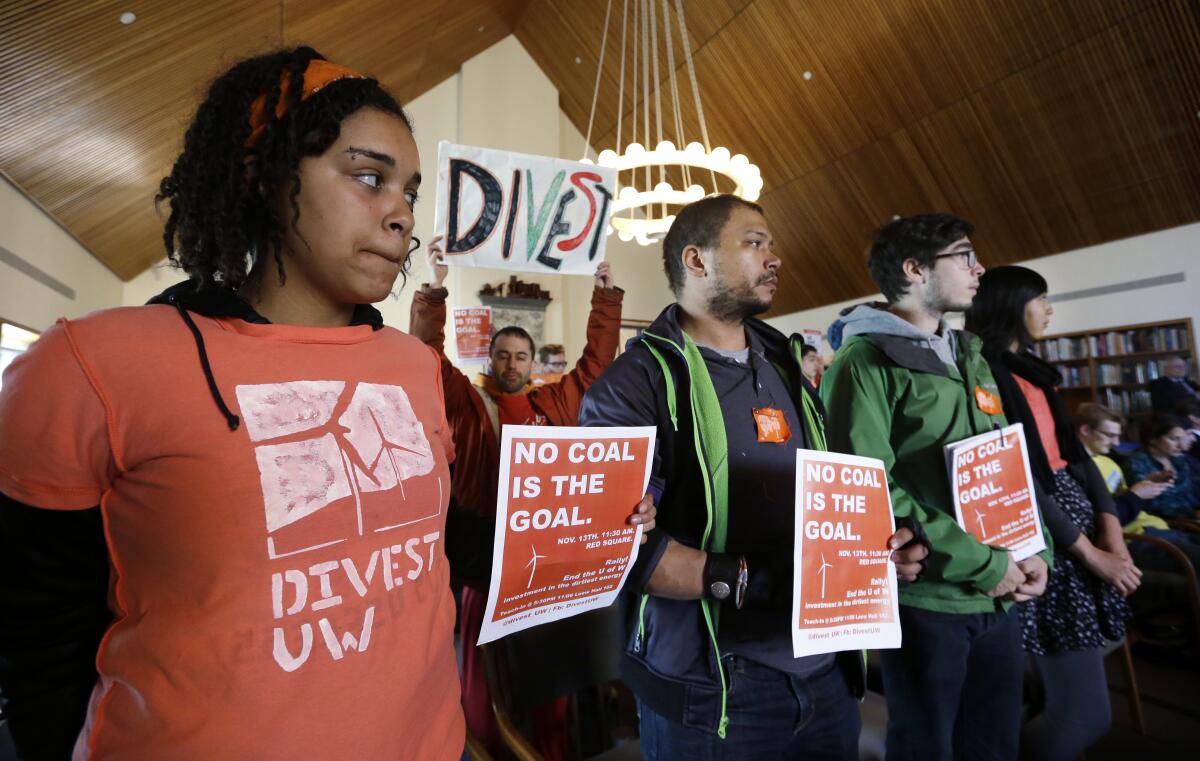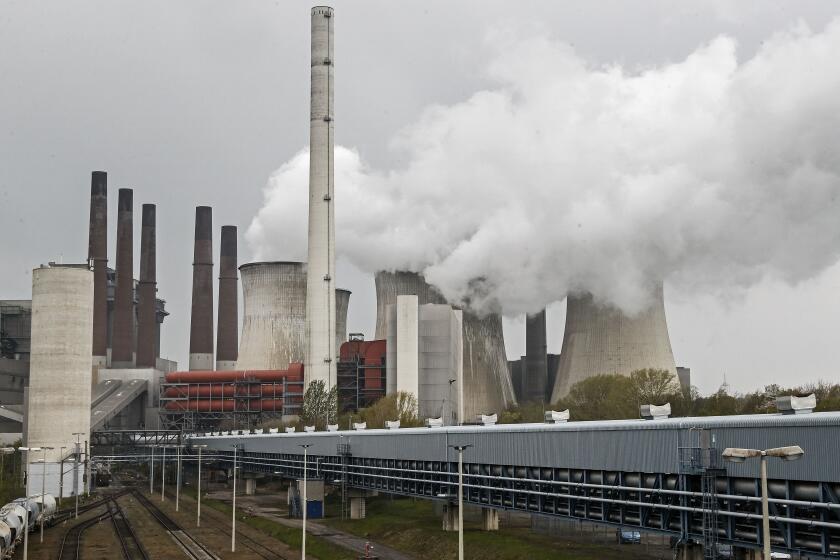Opinion: Why the fossil fuel divestment movement should reach hospitals

- Share via
I chose a career in medicine because I wanted to work somewhere with a strong ethical foundation. It was the same reason I spent years involved in the antiwar movement and taking action on climate change — which is now a concern across the profession.
Hospitals have pledged to lower operational carbon emissions. Several leading public physicians, including National Academy of Medicine president Victor Dzau, wrote in the New England Journal of Medicine: “Although many people consider climate change a looming threat, health problems stemming from it already kill millions of people per year.” And a survey in the Lancet found that 91% of health professionals are worried about climate change.
Which is why I think many of them would be shocked to learn how much of our own retirement money is invested in fossil fuels — the biggest drivers of climate chaos.
U.N. climate report shows we can’t just phase out oil and gas; we have to deliberately dismantle existing infrastructure, such as coal plants in China and drilling in Alaska.
The First Do No Harm campaign, in collaboration with the Climate Safe Pensions Network and Stand.earth, recently released a report examining the pension funds of four prominent private hospital systems: Kaiser Permanente, Mayo Clinic Health Systems, HCA Healthcare and Ascension. We found that these four hospital networks alone have invested at least $4.6 billion in fossil fuels and estimate that privately owned U.S. hospitals have well over $10 billion invested in the fossil fuel economy.
Kaiser Permanente, for example, has $80.2 million invested in Suncor Energy, among the world’s largest producers of environmentally destructive “tar sands” oil, which produces at least 17% more carbon pollution than conventional crude oil. The Mayo Clinic, often called America’s best hospital, has over $40 million invested directly in fossil fuel production giants, including Exxon Mobil and Conoco Phillips.
I believe hospitals deliver enormous benefits to their communities, and I know they have a financial responsibility to their pensioners and investors. But they are making a big mistake — for their balance sheets and their patients’ health — by investing in fossil fuels.
To start with, these investments are a bad bet financially. Despite a temporary surge in prices after Russia’s invasion of Ukraine, long-term analyses of the stock market make clear that the economic prospects of the fossil fuel industry are grim. The industry has been unable to deny that the economic shift to renewable energy has begun. The value of fossil fuel companies is poised for a crash as the world gets serious about limiting the use of oil, coal and natural gas. It is just a question of when.
But even more important is the role these investments play in climate change, of which fossil fuel companies are both the biggest driver and the biggest obstacles to solutions. These companies have spent billions lobbying the government to slow climate action and lied for decades about climate science and about their plans to stop polluting.
In that time, climate change has become a health crisis. The National Academy of Medicine calls it “one of the most significant threats to human health in the 21st century.”
Divestment’s true power is the ability to change minds and mobilize action, with effects that reach far beyond targeted investors and companies.
Health impacts from global warming and the continued burning of fossil fuels already claim 13 million lives annually from environmental factors including air pollution, disease and extreme weather events like California’s devastating wildfires. Scientists warn that continuing the status quo could lead to temperatures rising by more than 4 degrees Celsius (7.2 degrees Fahrenheit), resulting in cataclysmic levels of mass starvation and death. That’s the future these hospitals are currently investing in, even though they will be on the front lines of dealing with the consequences.
These kinds of adverse health impacts are what motivated the health industry’s last major divestment push, against tobacco in the 1980s and ’90s. The industry’s leadership led to Big Tobacco companies losing much of their political clout in Washington.
Drawing on that model, university students launched a fossil fuel movement a decade ago that has grown into a powerful arm of the climate movement. Some 1,590 institutions have committed to forms of fossil fuel divestment, totaling a staggering $40.5 trillion of assets under management. It has expanded beyond university campuses to include local governments, foundations, banks and investment firms. Since 2021 alone, institutions such as Harvard University, the cities of Baltimore and Chicago, and the Ford and MacArthur foundations have committed to divestment, citing a clash between fossil fuel extraction and their fundamental mission.
Hospitals should divest from fossil fuels for the same reason. We need to recognize that these investments fundamentally oppose our healthcare mission. We need institutions such as the National Academy of Medicine to call out fossil fuel companies as dangers to human health and provide leadership on how and why to incorporate fossil fuel divestment into existing climate change commitments across our industry.
The healthcare sector is capable of miracles. We mapped the human genome. We conduct microsurgery. We can — and must — divest from the fossil fuels that are sickening our patients and our world.
Don Lieber is a surgical technician, nursing unit coordinator and director of the First Do No Harm campaign for fossil fuel divestment in the health sector.
More to Read
A cure for the common opinion
Get thought-provoking perspectives with our weekly newsletter.
You may occasionally receive promotional content from the Los Angeles Times.












